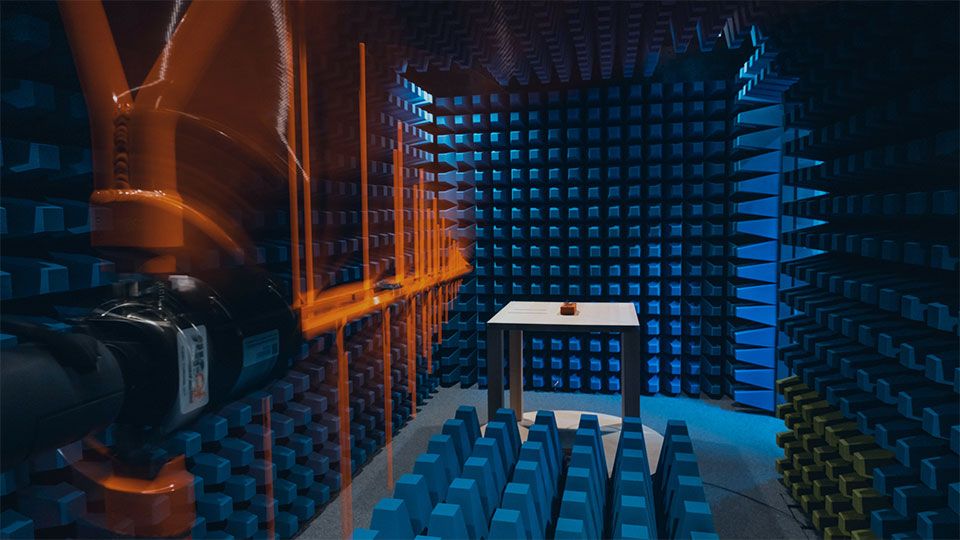Please note, that the third day of this training will take place in the laboratory of our partner EMV Peci in Oberschleißheim.

Analyzing and improving EMC with simulation & measurement
Identifying and resolving EMC issues in your electronic devices using simulation and measurement

In this training, you will learn how to effectively use simulation and testing in combination to get your electric device certified. This training is offered as a 3-day course.
Duration
3 days
Prerequisites
None
Software used
Ansys SIwave, Ansys EMC Plus
- Identify and improve EMC critical points
- Target-oriented development process by understanding EMC design-rules
- Understanding how simulation and measurement work together
- Also for beginners: no simulation knowledge necessary
Description
Every device that contains electronic components must be subjected to an electromagnetic compatibility (EMC) measurement at a certified test center before it can be placed on the market and used. The device is measured in its entire complexity, which usually consists of several boards, cables and housings, all of which influence the measured interference emissions. Therefore, it is important to avoid these by using an EMC-compliant design and, in the worst case, quickly finding and eliminating the source of interference by using a skillful approach. This training will give you an understanding of typical causes of EMC problems using practical examples and will provide you with the necessary know-how to approach the topic of EMC in your device development in a targeted manner with the help of virtual and real testing. You will be taught simulative and metrological approaches that you can already use during development and thus ensure passing the first EMC test without further design cycles. This approach allows you to significantly shorten development times and save costs.
This training is aimed at hardware developers for any type of electronics in all design phases from PCB layout designers to test engineers who would like to secure the final certification measurement through prior measurements. Knowledge of simulation and measurement is not required.
Detailed agenda for this 3-day training
Day 1
01 EMC Measurement and Simulation
- Brief overview of EMC standards: What is measured? Which limit value has to be observed?
- Grouping of interferences
- Potential of simulation in EMC: Which tool for which issue?
- The step from simulation to measurement
- Workshop: Identifying the effect of typical EMC issues in simulation and measurement
02 A bit of Physics behind EMC
- Electromagnetic coupling mechanisms
- Are EMC and EMI (Electro Magnetic Interference) related?
- Identifying unwanted antenna structures
- Workshop: Signal reception with an unwanted antenna
03 Identifying interference sources on PCBs
- Quick-check in Ansys SIwave: Signal Integrity (SI)
- Quick-check in Ansys SIwave: Power Integrity (PI)
- Correlation SI/PI with EMC: Several ways for identifying one EMC problem
- Workshop: We visualize an electric field around a PCB
04 EMC design rules for the PCB
- Correct arrangement of signal traces
- Consider the return current!
- Troubleshooting measures: Smart use of stitching vias, decoupling capacitors & Co.
- Workshop: Showing the effect of neglecting the return current
Day 2
05 From PCB to periphery
- How to deal with cables and housings at PCB-level analysis
- Actively minimizing emissions
- Smart use of passive emission avoidance (e.g., ferrite-cores)
- Workshop: Linking Ansys SIwave with other simulation tools
06 Influence of the housing on EMC
- Shielding by an enclosure
- Electromagnetic resonance in an enclosure
- Enclosure as parasitic radiator
- Workshop: Analysis of the enclosure with Ansys EMC Plus
07 EMC for cable harness
- The cable as an antenna
- Hints for EMC compatible cabling
- Simulation of cable harness with Ansys EMC Plus
- Workshop: Simulation and measurement of cable influence
08 Overall system EMC analysis
- Best practice for a systematic fault analysis
- Learned experience: Interpreting the root-cause from EMC measurement results
- Virtual lab tour: Measuring devices and their simulation equivalents
Day 3
09 Visiting the EMC lab
- Measuring devices: What do I use which measuring device for?
- Correct handling of the measuring instruments
- Workshop: Setup of an EMC measurement according to a CISPR standard
10 Doing an EMC measurement according to a CISPR standard
- Workshop: Live measurement of a PCB with and without faults
- Correct interpretation of the measurement results
- Correlation to findings from the simulation
11 Best of both worlds: Simulation and experiment
- Difference between simulating the components and measuring the complete device
- Limits of simulation, limits of measurement
- Field report: Frequent error sources in EMC design and measurement
- Workshop: Measurement of an external interference source
12 Eliminating EMC problems in the overall system
- Overview on measurement methods
- Countermeasures for the elimination of errors in the overall system
- Last resort: Damping of spurious emissions
- Workshop: Measurement with and without damping
Your Trainers

Steffen Seewald
Placement in the CADFEM Learning Pathway
Participant data
Additional information
Commentary
Whether eLearning, classroom courses, live online training or customized workshops - together we identify the best option for you.
Do you have questions on the training?
If you book through your university, you will receive a 50% discount on the stated fee on training courses and eLearning courses.
For more information on the validity and how booking with the code ACADEMIC50 works, please visit our page on training for academic users.
Straight after you sign up, an automatic confirmation of receipt will be sent to the email addresses you provided. Once you have successfully verified the data you provided, you will receive your personalized sign-up confirmation, containing further information on course fees, the billing address, etc., by email within two to three working days.
As soon as the minimum number of attendees has been reached, you will receive a final training confirmation containing further information. If you have booked an on-site training, we recommend that you wait until you have received this final confirmation before booking your travel and accommodation.
If the minimum number of attendees is not reached, we reserve the right to cancel the training seven days before it is due to start at the latest. We are happy to inform you on changing your booking to an alternative date. Please note that we accept no liability for hotel or travel bookings that attendees have already made.
Usually the training courses start at 9:00 am and end at 5:00 pm of the respective local time. The actual course times will be stated in the booking confirmation. Please note that, depending on the training host, there may be a possible time shift between your and the provider's local time. Therefore all local times are provided with the valid time shift to Greenwich Mean Time (GMT).
The training includes intermediate and final exercises to practice the elements covered in the training. The trainer will present the resolution of these exercises and will check the good understanding of each module of the course with the help of MCQ. A training certificate will attest to the validation of the knowledge assessment for each module and for the overall training.

Disability and Quality Referent




